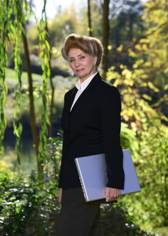Water Advocate Sharon Kleyne Calls for Greater Women Participation in Water and Health Issues
Press release
Water Advocate Sharon Kleyne Calls for Greater Women Participation in Water and Health Issues
Sharon Kleyne Hour Power of Water Radio Host Points to Women's Traditional Roles in Healing and Water Supply
Hear the Sharon Kleyne Hour Power of Water on World Talk Radio, Voice America, Green Talk Network and Apple iTunes
Since the earliest prehistoric times, women have played a dominant role in caring for the sick and obtaining the necessary fresh water that sustains all terrestrial life. Citing these traditional roles of women, water activist Sharon Kleyne, host of the Sharon Kleyne Hour Power of Water radio show, has issued a challenge to the world's women to take the lead in education and participation to assure that proper medical care and abundant, safe and sustainable fresh water are available to everyone, everywhere.

Sharon Kleyne is Founder of Bio-Logic Aqua Research, a global research and technology center specializing in and fresh water, the atmosphere and the effects of dehydration. Natures Tears® EyeMist® is the Research Center's signature product for dry eyes. Kleyne's globally syndicated Sharon Kleyne Hour Power of Water radio show is heard on VoiceAmerica and Apple iTunes.
Over the eons of human existence predating civilization and the written word, says Kleyne, gender roles were well defined and rarely circumvented. Men hunted and prayed to the gods and women cooked, maintained households, raised children, cared for the ill and elderly, gathered herbs and non-game food, and fetched water. In many parts of the world, these roles have not changed
In a recent radio broadcast, Kleyne expressed the belief that humankind would be well served if some of these traditional roles were brought back. As healers, nurturers and peacemakers, Kleyne sees an important and expanded role for women in global life and death issues such as water security, safety and sustainability and in health and healing. Kleyne's own global work, including the Netherlands based Women for Water Partnership, reflects this conviction.
Kleyne has extensively researched the role of women in water and healing. In prehistoric times, says Kleyne, when someone became ill, the women, who usually had considerable knowledge of herbal and traditional medicine, cared for that person. Some of their healing herbs, such as aspirin (willow bark), opium, digitalis (foxglove) and quinine (a rot fungus on trees), are still in use today.
Shamans, who were frequently - but not always - men, contributed mystical incantations and a purported spiritual connection. Shamans, Kleyne explains, were usually individuals who had a mystical experience while sick or injured - and were nursed back to health by a woman healer.
After about 5,000 BCE, when agriculture and civilization took hold and the various jobs in society become increasingly specialized, says Kleyne, healing became a full-time - and mostly male - profession. The most famous early doctors, such as Hippocrates and Maimonedes, and most of the early medical text writers, were male. Men also designed and built the great aqueducts and other water distribution systems.
A notable exception was Saint Hildegard of Bingen (1098? - 1179), says Kleyne. Hildegard was a nun, abbess, poet, composer, philosopher, theologian, herbalist and healer. One of history's great geniuses, Hildegard wrote dozens of books, including major texts on herbs and healing - based on knowledge she acquired from running the monastery's infirmary and herb garden. One of the few women allowed to speak in church, Hildegard went on several evangelical tours.
The role of women as caretakers of children, the elderly and the sick; and as fetchers of water, persists today, according to Kleyne. The sad news is that in some poor rural areas of developing nations, "traditional women's work" has become a weapon of repression. Women cannot go to school or participate in the community because cooking, caring for children and fetching water take up all their time.
Interestingly, Kleyne points out, in villages in Africa, Asia and Central America, where women have been freed from some of their traditional responsibilities, they have become active community leaders and successful entrepreneurs. Female entrepreneurs are now a major economic force in Kenya and other African nations. Their greatest contributions have been in water supply and community health.
Kleyne's lifelong dedication and mission is to conduct research and educate the world that there is nothing more important to life on Earth than fresh water and that for the health and survival of the human species, we must find ways to come together and devise sustainable solutions to the global water and health crises. Kleyne's personal objective is to assure that the world's fresh water supply - including the water in the atmosphere - is sufficient, safe, secure and affordable everywhere and for everyone. She wants future generations of children to know that we cared
Health + Diet
Environment
|
|
 Sharon Kleyne
Sharon Kleyne